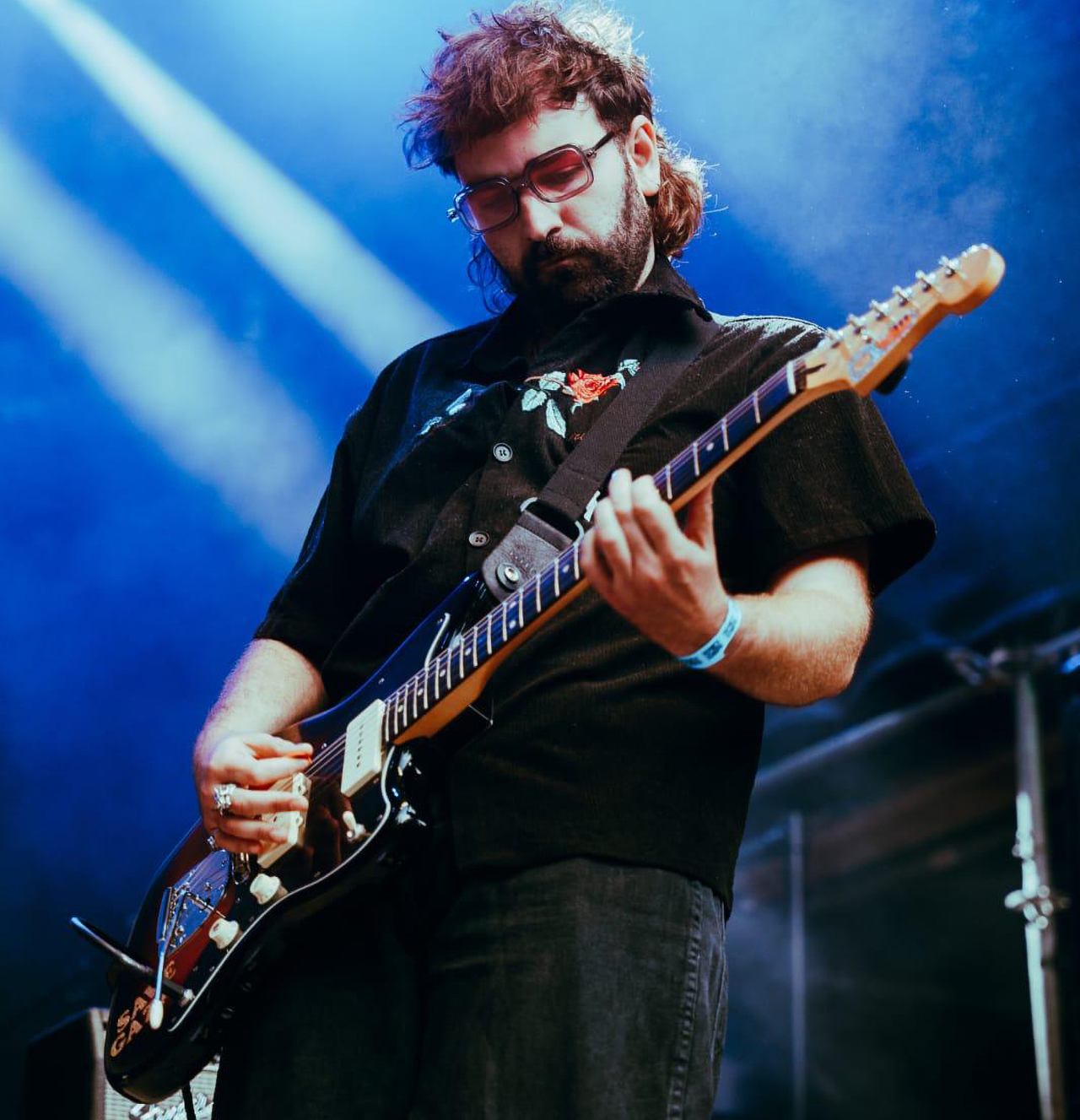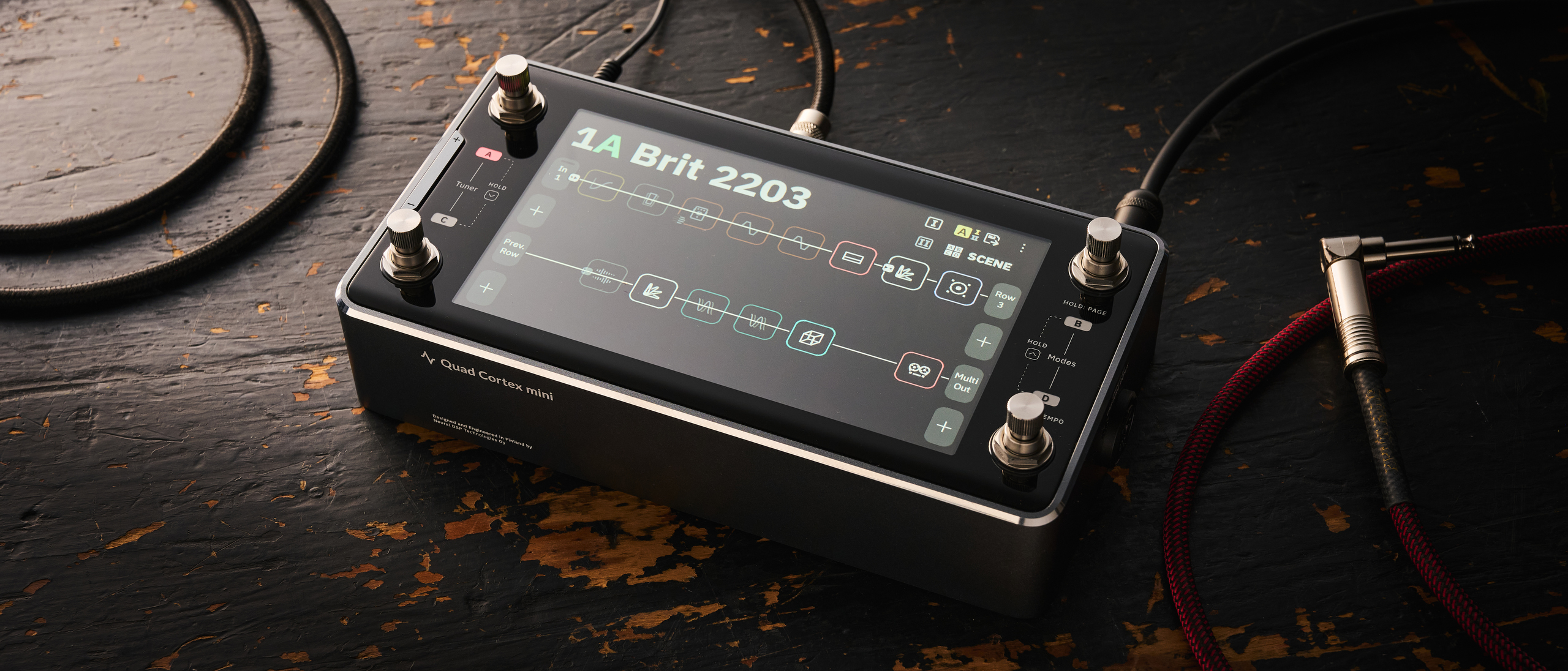“I wanted to learn a Nirvana song. The teacher was like, ‘Kurt Cobain is one of the worst guitarists in the world’”: Sub Pop-backed alt-rockers SPRINTS on guitar trolls, setting amps on fire – and the tonal benefits of olive oil
Second record All That Is Over sees the Irish group adding new sounds, avoiding scales, and continuing to confuse sound techs with their eccentric approach to gear

All the latest guitar news, interviews, lessons, reviews, deals and more, direct to your inbox!
You are now subscribed
Your newsletter sign-up was successful
We knew Dublin’s SPRINTS were going to be an interesting proposition the day they told us they’d been tackling stadium shows with Liam Gallagher using a backline of Boss Katanas.
Since we last spoke in 2024, they’ve continued to surprise. They’ve lost a guitarist in Colm O’Reilly, gained a guitarist in Zac Stephenson, released second album All That Is Over, signed to the venerable Sub Pop label, toured relentlessly and made the leap to full-time musicians.
“There’s still the fear every single day – ‘Are we going to pay our bills?’” says guitarist and vocalist Karla Chubb. “But you have to find calmness in the chaos: the fact that not every day is going to be the same.”
Stephenson had to get to grips with such weirdness pretty quickly. Initially drafted in as temporary cover, he proved a surprisingly good fit and was soon asked to join.
“I went from being in an office one day to playing a main festival stage to 20,000 people the next day – then back in work three days later,” he says. “I was like, ‘Oh, that was strange.’ And then it just kept happening!”
Chubb credits Stephenson’s arrival as one of several factors, including a break-up and a new relationship, that gave the tour-battered group a shot in the arm. “So much had changed in the year since [2024 debut] Letter To Self that I almost couldn't relate to the music anymore,” she says.
“Zac came in with fresh energy and a childlike innocence and wonder for it all. We went, ‘Nah what we’re doing is cool! We need to get a grip on ourselves.’ Now we’re like, ‘Let’s go!’”
All the latest guitar news, interviews, lessons, reviews, deals and more, direct to your inbox!
How have you evolved as players since album one and, in your case Zac, joining the band?
Chubb: As a guitar player, the main thing I’ve had to struggle with is confidence, and accepting that to be the best player for a track does not mean having the most impressive solo or riff. I probably consider myself a songwriter much more than I consider myself a guitarist.
Stephenson: I’m similar – I really fell in love with the guitar again in the pandemic. I’d been fronting and producing a band, but I was sharing a house with six people, so I couldn't make any noise, and I couldn’t leave! So I got into playing really softly. One of the biggest things I learned was the importance of dynamics and your picking hand.
I spent a few years trying to learn scales and things, which can be good. But I don’t think you get better from learning scales – it’s like a reference you can go back to if you’re stuck on a puzzle. When you’re playing you don’t necessarily think in scales.
We hear a surprising amount of guitarists say, “I don’t think of myself as a guitarist” like it’s a loaded term.
Chubb: I think it’s like a self-preservation thing. If I label myself as a guitarist, someone can be like, ‘Well, she’s shite at it!’ I remember vividly when I was first playing, I went to a lesson and I wanted to learn a Nirvana song. The teacher was like, “Kurt Cobain is one of the worst guitarists in the world!”

I was like, “First of all, fuck off! Secondly, that is objectively not true.” What a way to put someone down when they wanted to learn. You get a lot of that online too. There’s a lot of trolling, and calling yourself a guitarist opens you up to more of it. Maybe we just need to own it a little more.
One of the most notable elements of All That Is Over is the way you’ve worked in acoustic guitar and some gothic feel. Where has that come from?
Chubb: It’s pulled from flamenco and Spanish influence – that chromatic scale thing adds a lot of tension – and it’s all because I bought a nylon-string guitar. A music shop in Dublin was having a closing-down sale, and I picked up this nylon-string and it just felt right.
We were recording the nylon-string so close to the fretboard, but we wanted to stop all the squeaking when you shift
I wrote three or four songs within a week or two. It’s just so accessible. You make the art with the tools you have at your disposal. There’s no plugin. There’s no “get the interface.” The phone’s voice note app starts recording and it’s just like, “Go!”
You worked with producer Daniel Fox again. Last time you spoke about him, there was talk of fingers bleeding. How did he push you this time?
Stephenson: This time there was olive oil on the fingers!
Chubb: Yeah – we were playing the nylon-string and we were recording it so close to the fretboard, but we wanted to stop all the squeaking when you shift. It really worked.
How much olive oil are we talking?
Stephenson: A tiny ramekin thing that you dip your fingertips in. Not enough for your bread in a restaurant – just dip them in, rub a little bit of it off and play.
When it came down to gear on the album, what made the cut?
Chubb: My main instrument is the Jagstang. I’ve always loved a short scale, and I think it has a lot more bite than the Mustang. So we brought the Jagstang, a Jazzmaster, and a Gretsch to have that double humbucker grit on some of them. Then we had the nylon-string and a standard Fender Dreadnought acoustic.
Stephenson: My workhorse is my Italia Rimini 6, a Trevor Wilkinson brand. I got it second-hand years ago and they’ve gotten more expensive since then. It’s got two humbuckers; it’s kind of like a Rickenbacker style, but it’s so versatile.
I use the neck pick up a good bit on it. It’s quite warm. For anything kind of spikier I used the Jazzmaster. I used a lot of the Jazzmaster tremolo arm as well. For Desire, it was just feedback from the amp and I was moving the pitch around with the trem bar. Then Dan just did some magic and made it sound not-terrible!

What are your guitar highlights of the record?
Chubb: I have a few. Zac’s little spaghetti Western riff on Desire. The riff for Something’s Gonna Happen originally was a very simple one I wrote; drop D, and Zac added a slide into the first note. It added so much texture – I was like, “Oh, he’s a genius!”
Stephenson: In the intro to Better; there’s a rising feeling [from Karla’s Boss Harmonist] that’s like you’re being pulled from the depths of Hell. Then the solo in Rage, which was not an intentional take. I was messing around on a guide track – I don’t know what effects I had on and I hit a wrong note as well! But Dan was like, ‘You’re not doing that again!’
The sound engineers are always so confused when Karla plugs the nylon-string into the amp through all the pedals
Zac Stephenson
What was the song that set the amp on fire, Karla?
Chubb: That was Coming Alive, on the Fender Princeton. There were two of them, and they both looked absolutely battered – the front shell was coming off the one I used. We were always bringing coffee and food into the control room, so I thought it was someone burning their toast when the amp went up. We had to extinguish it, a little bit!
Speaking of risky amps, I caught a gig recently and it looked like you were plugging in your nylon-string acoustic into your amp.
Stephenson: The sound engineers are always so confused when Karla plugs the nylon-string into the amp through all the pedals. But 99.9 percent of the time it sounds unbelievable. They’re like, “Where’s that coming from? I can’t see it on the thing!” And it’s like, “That’s the amp!”
Chubb: It’s class! I also lovebeing able to put the chorus on, like on Desire. I think when you put a guitar straight through a DI, it just doesn’t have the same effect. I want the warmth of the Deluxe Reverb.
On the next tour we’re going to have a second amp with its own pedalboard, because we’ve struggled with levels. Playing through the pedalboards is fun. A nylon-string in a cowboy song with a Fuzz War? C’mon!
You previously talked about playing Liam Gallagher stadium shows with Boss Katana practice amps. You seem to have a happy disregard for the tonal “rules.”
Stephenson: All new tones were made by people breaking the tonal rules. What's Jack White's entire career been based on, other than doing things that were considered weird at the time?
Chubb: I don’t know any of the tonal rules anyway. And also, we’re poor! I’m like, “I’m gonna plug this into that! Why not?” Zac and I are rebuilding our pedalboards and our sound engineer is such a frequency and voltage nerd. He’s like, “You should get this equalizer pedal, then I can knock out some of these frequencies.” I’m like, “No, it’s fine – let there be noise!”
- All That Is Over is out now on SubPop (US) and City Slang. SPRINTS tour the UK in November and the US in January and February.

Matt is Deputy Editor for GuitarWorld.com. Before that he spent 10 years as a freelance music journalist, interviewing artists for the likes of Total Guitar, Guitarist, Guitar World, MusicRadar, NME.com, DJ Mag and Electronic Sound. In 2020, he launched CreativeMoney.co.uk, which aims to share the ideas that make creative lifestyles more sustainable. He plays guitar, but should not be allowed near your delay pedals.
You must confirm your public display name before commenting
Please logout and then login again, you will then be prompted to enter your display name.



